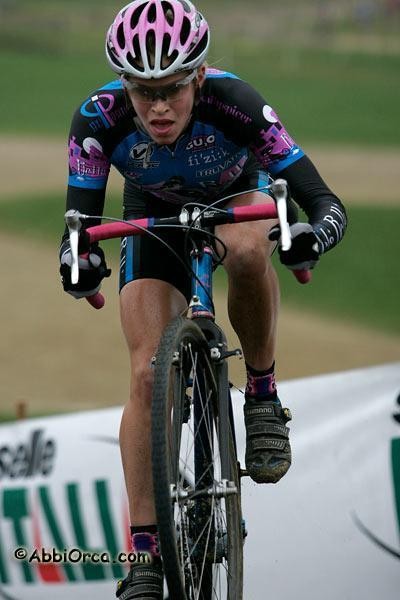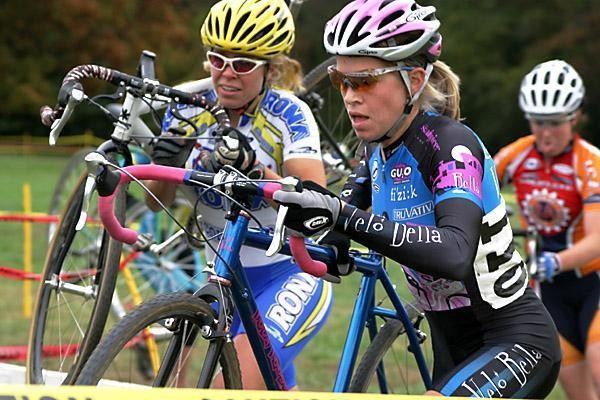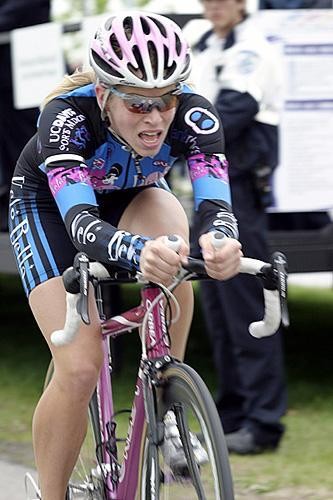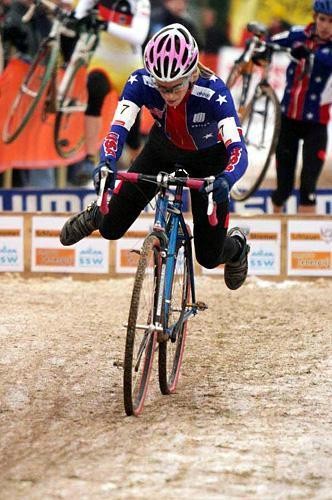Barbarella, Queen of the 'cross Galaxy
It's funny how life can imitate art. The liner notes to the 1968 Jane Fonda cult classic invite the...





An interview with Barbara Howe, October 10, 2005
It's funny how life can imitate art. The liner notes to the 1968 Jane Fonda cult classic invite the viewer to 'See Barbarella do her thing!' Velo Bella cyclo-cross racer Barbara Howe has been nicknamed Barbarella most of her life, and as Cyclingnews' MTB Editor Steve Medcroft finds, the catch phrase could easily be her own.
The 'thing' that you want to see Barbara Howe do is ride off the front of US cyclo-cross races. In 2004 alone, she stood on the podium in almost every national-caliber 'cross race in the season, winning three along the way. In fact, the only race she didn't do well in was the US National Championships in Portland, Oregon (Howe finished on the lead lap but three minutes and eight places behind winner Katie Compton).
Just like Barbarella bumped through the universe, comically oblivious to the dangers and threats being thrust at her, Howe has had a few misadventures of her own. One involves a 18-hour car pool to a mountain bike race with Howe-led navigation down dirt roads and into a speed trap. Another involves her use of training to escape a relationship. But that's not where her story starts...
The balance bar and life without a car
Howe wasn't always the Queen of the 'Cross Galaxy. She discovered athletics at eight years old in a very traditional way: gymnastics class. "I did gymnastics through the end of high school," she says from her her home in Marin, California. "I was doing ballet but switched because gymnastics was much more interesting - there was a trampoline opposed to standing around in front of a mirror hanging on a bar." Howe says she took gymnastics seriously enough but adds: "I was competitive so I guess that's not mediocre, but I liked bouncing and swinging myself around much more."
Necessity turned Howe to cycling. "When I moved to college, I didn't have a car so I rode my bike around," she says. The bike? "A hybrid. My parents bought it for me when I was in eighth grade. I had ridden it since high school because I never had a car."
Get The Leadout Newsletter
The latest race content, interviews, features, reviews and expert buying guides, direct to your inbox!
Howe grew interested in cycling as a sport when a roommate joined the University of Denver cycling team. "I liked riding my bike," she says. "I liked the freedom; even though I had a car at the time, I just wasn't into driving so my bike was my way to get out of Denver. I got a road bike when I joined the cycling team. I was the only woman on the team."
Joining the cycling team exposed Howe to racing. Her first race involved a half-day drive to Las Cruces, New Mexico. "I think I might have come dead last," she says about that first learning experience. "I didn't take a sip of water or any food during the whole race. I rode so hard, I was sick all the way home. And I learned not to put your bike behind a car on the start line; someone backed over my bike right before the race." Strangely not discouraged by the early missteps, Howe made it to a bunch of races after that. "And I don't know how but I actually did okay in some."
Barbarella rides a mountain bike
Howe hung up her cycling shoes after college and moved to Mammoth Lakes, California. "At the time, all I wanted to do was climb rocks," she says. "I climbed for several years after school."
But you can't live in Mammoth without being exposed to mountain biking and soon enough, Howe found herself getting pedaling again. "The summers in Mammoth are awesome. I rode my mountain bike just because it was good way to check things out and get further than walking. It was 2001, the last year they had NORBA Nationals before the break. I did the Sport race just for fun and crushed everyone. It was awesome."
And addictive: "I won by a couple of minutes and thought, 'Wow, I must be kind of good at this' so the next summer (2002), I decided that I should be an expert and did a bunch of NORBAs."
Like most expert-class racers, Howe financed those early seasons herself; sharing rides and even scheduling an East Coast trip to her parent's home in Pittsburgh at the right time to make the Snowshoe and Vermont NORBAs. "I drove to Durango with two friends of mine that summer too and we took some stupid route that I decided on because I didn't have a map. It took us like 18 hours in my Volkswagen van without air conditioning. It was 100 degrees the whole way. It was epic. I routed us down dirt roads. It was pretty sweet."
After a season in the expert ranks, Howe made the jump to pro. "The next year (2003), I won the Sea Otter expert-class race by several minutes so I upgraded to pro. I did Big Bear, Snowshoe, Vermont and Sand Pointe, Idaho." The jump pushed Howe back in the standings. "It took everything I had to finish on the first page of results," she says about her early races. "I was like 38th or 40th most of the time."
In a foreshadowing of her breakout career in cyclo-cross though, Howe says she was actually stronger in Short Track. "I finished 20th in a Short Track my first year and I'm not sure why it was better for me. Maybe I have those kinds of muscles. Maybe because you don't have to plod along for hours on end, it was easier for me to ride with intensity. Maybe because Short Track's aren't so technical. Maybe because the kind of courses where I learned to ride – Mammoth, Sea Otter, Big Bear – are made up of lots of dirt roads and smooth trails; there are no crazy roots and muddy downhills like at Snowshoe."
The switch to cyclo-cross
Whatever the differences between Short Track and Cross Country, Howe learned that she preferred shorter, harder efforts over longer endurance races. When she tried cyclo-cross that winter, something clicked. "I moved with my boyfriend from Mammoth to Marin to make the travel to races a little easier. There is just every option in cycling available to you in Northern California. Gina Hall, Carmen Delusio and Rachel Lloyd - all multi-time national cyclo-cross team members - all lived and raced here so when I went out and tried 'cross, those guys were there. It made it cool."
Howe admits than she was in "way over my head" at first but she could sense that she had potential and was hooked on the format. It helped that the coach she worked with to make her a better mountain biker was hot for 'cross. "I was a pro mountain biker just not that good of one," she says. "I got a coach mainly for mountain biking. But my coach (apparently a guy simply named Elmo) works with a lot of the top women and is really into 'cross. It rubbed off on me."
Howe stuck to local 'cross that first season but did try her hand at the 2003 Nationals in Portland . "I did well," she says. "It made me feel like I should focus more on 'cross so I road raced all summer and during the 2004 'cross season, I decided to travel - like what I had done with mountain biking."
The first race in her new, national campaign went well. "I won it. Then I went to Granouge, Delaware and won again. I won another one the next day in Philadelphia and in Gloucester the next weekend, I finished fourth in both races; I was truly shocked."
Making it all work
With success, Howe could finally see how she might make part of her living from racing, although in 'cross, the opportunities are rare. "The prize money is actually pretty good compared to the other riding I was doing; I won all of 10 or 12 dollars racing mountain bikes and you have to be on fire for seven days in a row to win a road race with a great paycheck like Altoona. In 'cross, I can get my entry fee back in 40 minutes."
Beyond prize money though, the sport is financially thin for the athletes. "I don't know of any salaried cyclo-cross women," Howe says. So instead of chasing a non-existent factory team ride, Howe races with Velo Bella. "Velo Bella is a lot of things," she explains. "It's a gigantic club first of all. Within the club, there are the racers. Within the racers, there is the elite road and 'cross team. It's interesting; you could feasibly start on the team doing your very first race and then down the line, you could still be on the team and be racing at the elite level. We're very developmental."
Developmental and funded in a very grassroots way, Howe adds. "Two of us went to (cyclo-cross) World's last year (Howe and team-mate Sarah Kerlin). We put a PayPal link up on our Web site and the team threw a huge party to scrape together the money for the trip."
Besides help from Velo Bella, Howe will work full-time to fund her 2005 campaign. "I work at the Bicycle Odyssey in Sausalito, California. It's a neat shop; we specialized in high-end road bikes. The owner used to race and he's really supportive of my racing. There are times when I say I need to go train for three hours in the morning and he'll let me come in at noon and I take a week off here and there to go to races."
Now that she has the financing figured out, Howe has set new racing goals for 2005. "I'd like to make the national team again because I want to go back to Europe," she says. "If I could repeat what I did last year, I'd be happy. I'd like to do better at the USGP as well, make it into the top three. And I'd like to not choke at Nationals and be somewhere on the podium."